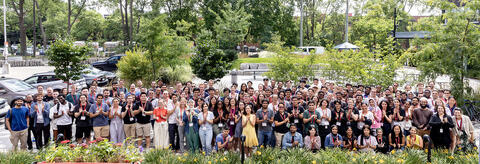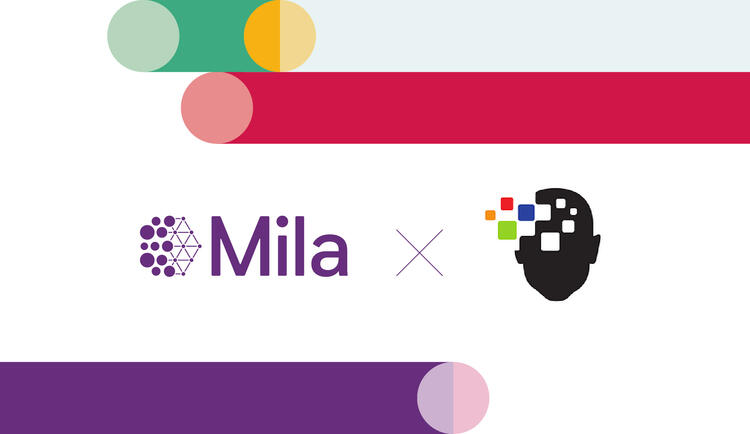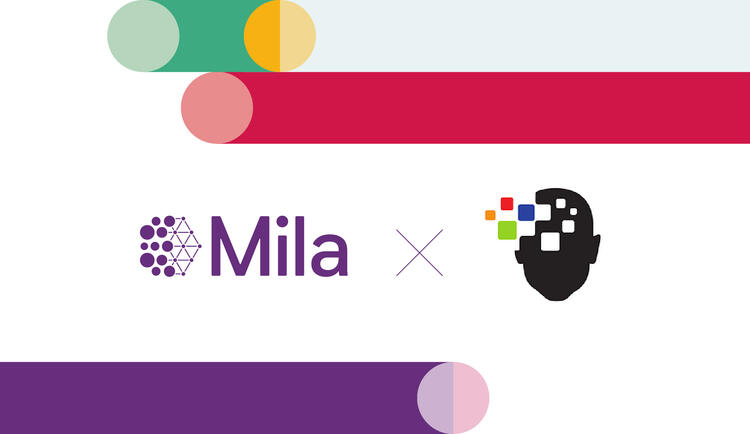
From July 17 to 21, 2023, Mila had the great pleasure of hosting this year's edition of the Deep Learning and Reinforcement Learning Summer School (DLRLSS) organized by CIFAR, in partnership with the Vector Institute and Amii. More than 150 participants from 19 countries gathered in Montréal to learn from top experts in AI, and this year’s edition put a special emphasis on how to incorporate ethical practices throughout the development pipeline.
DLRLSS 2023 was CIFAR's first in-person summer school since the pandemic started. Participants got familiar with cutting-edge research in AI and attended networking events and mentorship sessions. They also bonded with their peers through social events, including a very Montreal-esque show of the Cirque du Soleil.
Over the course of a week, 24 speakers from Canada and abroad showcased the latest advances in research on areas such as reinforcement learning, causality, computer vision and robotics.
Leading edge of AI research
Liam Paull, Core Academic Member of Mila, Canada CIFAR AI Chair and member of the DLRLSS’s program committee, said that the success of this years’ Summer School was largely due to the broad range of topics explored by speakers and participants.
“We started with introductory content on supervised learning, deep learning and some of the core technologies that underpin the development. Subsequent to that, we had specific, more targeted lectures and discussions about generalization, deep reinforcement learning, model-based reinforcement learning, and deep learning applications in health or quantum physics,” he explained.
The first edition of the DLRL Summer School was held in 2005, and much has evolved in the field of AI since. As such, the event has become a way to showcase CIFAR’s Pan-Canadian AI Strategy and Canada’s three National AI Institutes (Mila, Vector Institute and Amii) who each host the summer school on a rotating basis.
And while the program exposed participants to the latest technical advances and broad scientific directions in the field, this year’s edition also put responsible and ethical AI at the forefront of the curriculum, Elissa Strome, Executive Director of the Pan-Canadian AI Strategy at CIFAR, explained.
“It’s so important for us to engage with early-career researchers because they’re the ones who are developing the future technologies. In many cases in their undergraduate and graduate training, issues around societal implications and ethics of AI are not well examined and the summer school is a chance to get them thinking about these topics,” she said.
Ethical design and use of AI systems
The summer school opened with a message from Mila Founder and Scientific Director and Canada CIFAR AI Chair Yoshua Bengio to participants, all well-versed in machine learning techniques: “You are going to wield a lot of power, and with great power comes great responsibility.”
“We have to think very carefully about what we do with the power that we bring into the world,” he emphasized.
To that end, several speakers explored how to incorporate ethical principles and fairness in AI and how to mitigate biases, inequality and discrimination. An Indigenous AI module, facilitated by Gina Doxtator and Amy Licker, also sought to better integrate Indigenous perspectives in AI development.
Mila Core Academic Member and Canada CIFAR AI Chair Golnoosh Farnadi, gave an introduction to ethics in AI and showed how technical approaches can help mitigate algorithmic discrimination.
“AI is used in domains that have influence over people’s lives,” she said, reminding that fairness is not just a technical challenge to solve and must be taken into consideration at all stages of AI system development.
Yoshua Bengio said in a presentation that “machine learning will completely transform scientific discovery,” with huge potential benefits in the fields of biology and climate science, while also reminding participants that AI safety is paramount to minimize risks, avoid power concentration and ensure that we “build machines that are going to be useful and don’t end up hurting us.”
Elnathan Tiokou, a PhD student at Polytechnique Montreal, said the event allowed him to network with people from all around the world and from a wide range of backgrounds. Beyond the conferences on reinforcement learning, he especially enjoyed the discussions around the responsible design and use of AI systems.
“These talks point to the importance for us to be aware of the damages that our intelligent systems can cause in society. It is not only important to build powerful systems, but also to ensure that down the line, they don’t take precedence over humans and that we keep control over what we are building.”
In addition to CIFAR and Mila, the Vector Institute and Amii, this year’s event was made possible through the generous support of Silver Sponsor Telus; Bronze Sponsors DeepMind, MDA, Ontario Power Generation and Roche; and non-profit partners IVADO and the National Research Council Canada.
CIFAR will post public videos featuring some of the DLRL talks later this summer.




